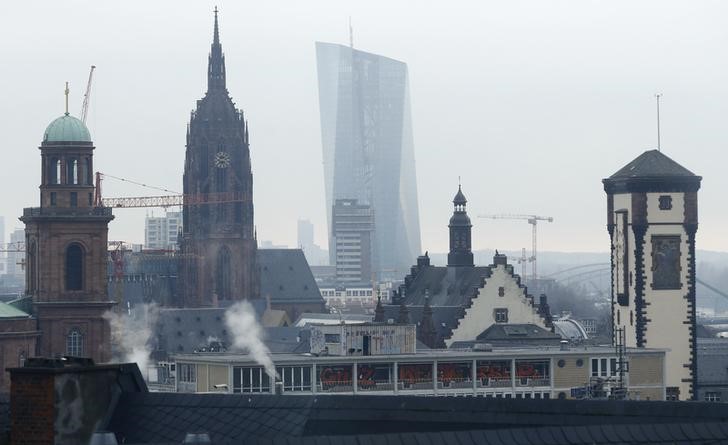(Bloomberg) -- The European Central Bank won’t make much progress raising interest rates because it’ll tighten just as the U.S. economy slows, predicts Pacific Investment Management Co.’s Andrew Bosomworth.
“I don’t think Europe will get very far above zero,” Bosomworth, a managing director at Pimco, said in an interview in Frankfurt this week. “There’ll be a very short window in which the U.S. Federal Reserve is on hold, and Europe can keep on growing and the ECB can keep on normalizing, before the slowdown kicks in over here through the trade channel.”
Investors expect the ECB to raise borrowing costs from record lows late next year, and Bosomworth predicts the first step will be to lift the deposit rate by 15 basis points from the current minus 0.4 percent. He says it’ll then move all official rates together, pushing the main reference rate to a quarter percent from the current zero.
“Beyond that is maybe when the cold weather from the North Atlantic starts blowing over in our direction,” he said.
U.S. Moderation
The U.S. economy is in its second-longest expansion on record, raising speculation over when the run will end. Growth is expected to moderate in 2019 as the effects of President Donald Trump’s tax cuts wane, and his trade tariffs and a strong dollar weigh on the economy.
Bosomworth disputed ECB President Mario Draghi’s claim that the euro zone can withstand faltering exports by relying on domestic demand. He noted the region’s current-account surplus -- more than 3 percent of gross domestic product -- as a testament to the reliance on trade.
“Once the winds from abroad start blowing in an unfavorable direction, it’ll soon filter through to all Europe’s indicators that cover the business cycle,” he said.
As if to prove his point, GDP reports on Tuesday showed the euro-zone economy growing at its weakest pace in four years. Italy’s output stagnated and the Bundesbank has said German growth probably stalled last quarter.
The currency bloc could face hard choices come the next downturn if rates are still low. The response will need to be fiscal and Germany will have a lot to contribute, Bosomworth said. It’ll be up to Chancellor Angela Merkel’s successors -- after she said she won’t serve another term -- to agree to the necessary changes in the euro zone’s makeup.
“Any form of risk-sharing will include some form of a transfer union,” Bosomworth said. “Treaty changes will require the courage of the next generation of politicians to embark upon this route, so which way they are inclined to go is therefore crucial.”
Ultimately, as the euro-zone population ages, there are parallels with another developed economy that has struggled for years to escape the zero lower bound.
“Japan could be our future,” Bosomworth said.
